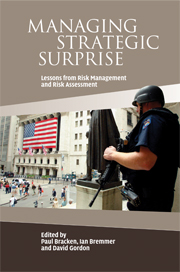Book contents
- Frontmatter
- Contents
- List of figures
- List of tables
- List of contributors
- Acknowledgements
- 1 Introduction
- 2 How to build a warning system
- 3 Intelligence management as risk management: the case of surprise attack
- 4 Nuclear proliferation epidemiology: uncertainty, surprise, and risk management
- 5 Precaution against terrorism
- 6 Defense planning and risk management in the presence of deep uncertainty
- 7 Managing energy security risks in a changing world
- 8 What markets miss: political stability frameworks and country risk
- 9 The risk of failed-state contagion
- 10 Conclusion: managing strategic surprise
- Index
- References
7 - Managing energy security risks in a changing world
Published online by Cambridge University Press: 14 May 2010
- Frontmatter
- Contents
- List of figures
- List of tables
- List of contributors
- Acknowledgements
- 1 Introduction
- 2 How to build a warning system
- 3 Intelligence management as risk management: the case of surprise attack
- 4 Nuclear proliferation epidemiology: uncertainty, surprise, and risk management
- 5 Precaution against terrorism
- 6 Defense planning and risk management in the presence of deep uncertainty
- 7 Managing energy security risks in a changing world
- 8 What markets miss: political stability frameworks and country risk
- 9 The risk of failed-state contagion
- 10 Conclusion: managing strategic surprise
- Index
- References
Summary
Introduction
In just a few years the hard truth about declining energy security has reached the upper levels of policy making in consuming countries. The European Commission's “Energy for a changing world,” in which its ambitions for a clean, secure and efficient energy policy are communicated, and the recent report by the American National Petroleum Council “Facing the hard truths about energy” share the growing concern about the development of the global energy system. The need to meet current and future energy demands within the constraints of climate change policies and the increasing insecurity of oil and gas supply has not only elevated energy to the top of the political agenda in the US and Europe, but also made energy a national priority in Asian countries such as China, India and Japan. As a result, energy policy is no longer an issue for economic policy makers alone, but has also become part of the trade, environment, foreign affairs and security policy agendas. At the same time, energy has also gained in strategic value to oil and gas producing countries, in terms of its contribution to growth, trade, income for the government and foreign direct investments in the main consumer markets. For Russia, for instance, energy has contributed to its swift come-back as a major player in international affairs, while China's energy-related ventures into Africa and elsewhere have underpinned the international and strategic nature of that country's rapid ascent as a geopolitical power.
- Type
- Chapter
- Information
- Managing Strategic SurpriseLessons from Risk Management and Risk Assessment, pp. 228 - 264Publisher: Cambridge University PressPrint publication year: 2008
References
- 1
- Cited by



